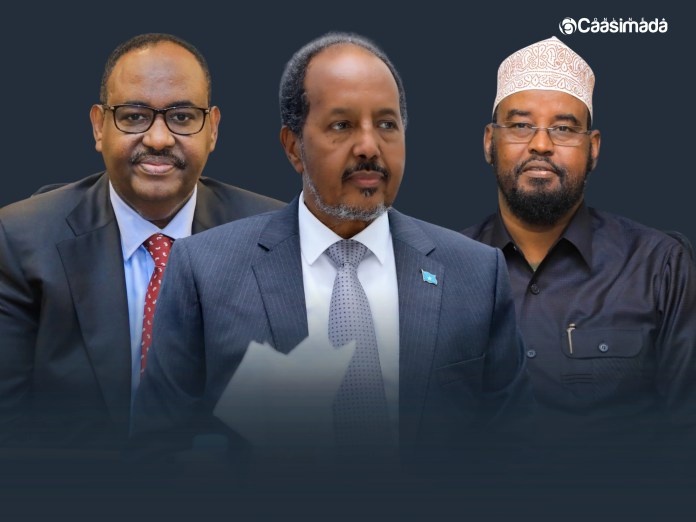MOGADISHU, Somalia – Somali President Hassan Sheikh Mohamud announced Wednesday that his government has opened negotiations with the semi-autonomous states of Puntland and Jubbaland, in an effort to defuse a bitter political feud that has paralyzed national reforms and fueled armed clashes.
The protracted standoff with the two influential Federal Member States (FMS) has undermined Somalia’s fragile state-building process, threatening to derail critical elections and distracting the government from its ongoing war against the Al-Shabaab jihadist insurgency.
Speaking in an interview with Al-Arabiya television, Mohamud confirmed that dialogue was active on several fronts. “We are still in talks with Puntland and Jubbaland, and we hope the issue with Jubbaland will be resolved before the elections,” he said. “The dialogue and engagement will continue.”
The president emphasized that holding local council elections remains his government’s immediate priority, with national polls to follow. Yet reconciliation with Puntland and Jubbaland is widely seen as essential for any electoral process to be considered credible across the country.
A rift over constitution and territory
The crisis with Puntland, a strategically significant state in northeastern Somalia, began in March 2024 after the federal parliament passed constitutional amendments. Puntland leaders argued that the changes centralized authority in Mogadishu and eroded regional autonomy, prompting Garowe to suspend cooperation with the federal government.
Tensions spiked further in October 2024 when Mogadishu released a new national map labeling vast portions of Puntland as disputed territory. Garowe denounced the move as a direct assault on its sovereignty.
The dispute soon extended into economic and security domains. Mogadishu accused Puntland of obstructing federally sanctioned oil exploration projects, while Puntland countered that the government was attempting to seize control of its natural resources.
By early 2025, the fallout had disrupted security cooperation, with both sides accusing each other of failing to coordinate operations against Islamic State (IS) militants entrenched in Puntland’s Bari mountains.
The situation grew more complex in July 2025 following the declaration of the Northeastern Somali Regional State, a newly formed federal entity claiming authority over the Sool and Sanaag regions — territories that Puntland also claims.
Electoral crisis and armed clashes
The conflict with Jubbaland, in the country’s south, erupted after the disputed re-election of its veteran leader, Ahmed Mohamed Islam, better known as Madobe, in November 2024. Mogadishu rejected the result, dismissing the vote as illegitimate.
The dispute swiftly escalated into a legal confrontation. A court in Mogadishu issued an arrest warrant for Madobe on charges of treason. In response, a Jubbaland court retaliated by issuing a warrant for President Mohamud himself. The federal government then went a step further, requesting an Interpol Red Notice for Madobe’s arrest — a move that Kismayo condemned as politically motivated.
By December 2024, the conflict spilled onto the battlefield. Federal troops deployed to the southern border town of Raskamboni clashed with Jubbaland forces in fighting that reportedly included drone strikes — a dangerous escalation from political rhetoric to armed confrontation.
The violence reignited in July 2025 in the contested Gedo region, after Mogadishu appointed Abdirashid Janan, a former Jubbaland security minister with a controversial past, as regional intelligence chief. His arrival alongside federal reinforcements triggered new battles that displaced civilians and closed schools, deepening the military standoff.
High stakes for national stability
Somalia operates under a delicate federal system where collaboration between the central government and Federal Member States is essential for both governance and security. The decision by Puntland and Jubbaland to boycott a national consultative forum in June 2025 underscored their ability to stall the national agenda.
Analysts caution that the internal disputes are draining vital resources and attention from Somalia’s most pressing challenge: the Al-Qaeda-linked Al-Shabaab insurgency. The International Crisis Group has stressed that resolving these constitutional and political disputes is crucial for ensuring long-term stability in the Horn of Africa nation.
As Mogadishu pushes for reconciliation, reports in Emirati media suggest that the United Arab Emirates (UAE) — a key ally to both the federal government and its regional rivals — has stepped in to mediate. The success or failure of these talks will be a defining test of Somalia’s capacity to overcome internal divisions and chart a path toward a more stable, unified future.


